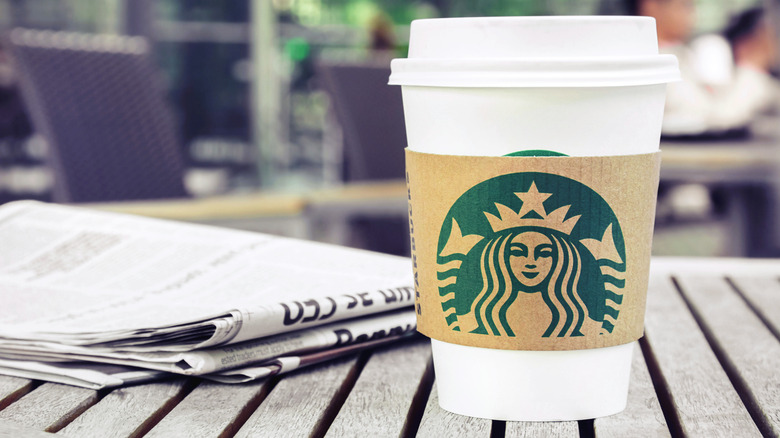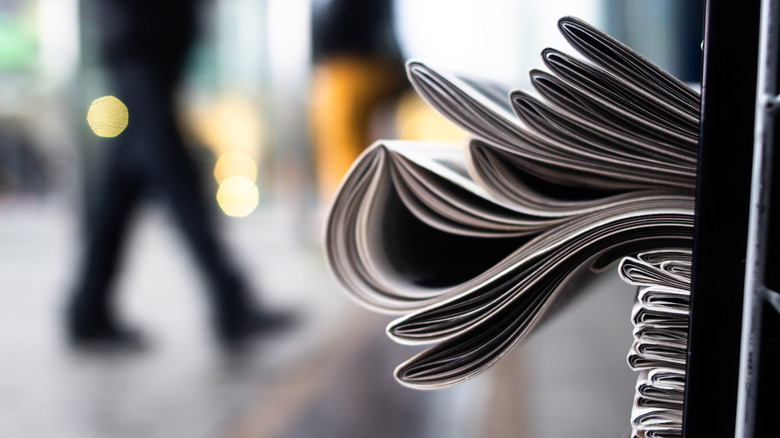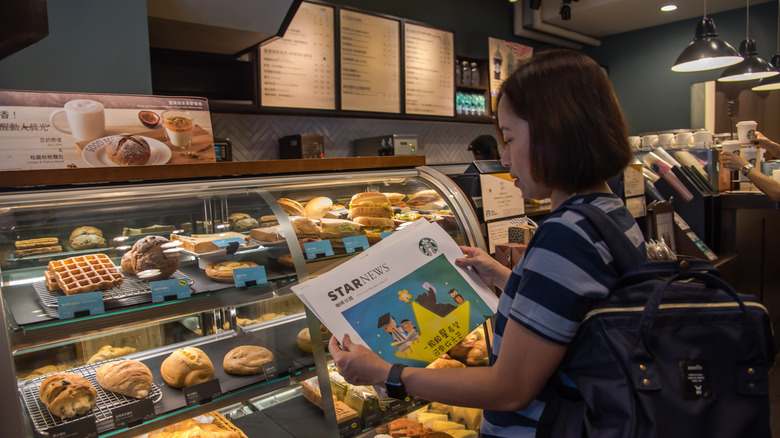The Hilarious Reason Starbucks Stopped Providing Newspapers
If you have the itch to sip a cup of your favorite coffee while keeping up with current events in any of the latest local, national, and global newspapers at a Starbucks location, we hate to tell you that you can't. That's right: The global coffee mogul announced in August 2019 that it would stop selling local and national newspapers across its 8,600 U.S. locations, as The Seattle Times reported at the time.
Sounds bizarre, doesn't it? It kind of is. When you think of going to a coffee shop, it's basically assumed that stacks of books and newspapers run aplenty around the café area, just waiting to be picked up by the digital nomads, working professionals, and out-and-about citizens of the world. That's not the case anymore though with Starbucks, which is now going on year three of no newspapers in its stores. The question here is simple: Why? There's actually a pretty hilarious reason why Starbucks stopped providing newspapers.
Accidentally stolen newspapers
Here's the thing: Unless something is clearly stated as free, it most likely isn't. For decades, Starbucks hosted influential newspapers like The New York Times and the Wall Street Journal on racks available for customers to purchase. The only problem? People thought they were free. According to Mental Floss, Starbucks stopped supplying newspapers in its store locations because too many would freely pick up a copy of these newspapers without paying for them. Customers wouldn't necessarily try to be sneaky about it and "steal them," but it was erroneously assumed that the newspapers were there for the taking, sans charge. Some would openly pick up a copy and read it while sipping on their cup of coffee in the café, get their fill, and leave it on the table. Others would be seen walking out with a copy after getting their coffee to-go, taking the whole issue with them.
In a 2019 Reddit thread, posters who claimed to be Starbucks employees commented extensively after the company first stopped selling newspapers in all of its U.S. locations. "Starbucks to stop selling newspapers because nobody pays for them," a thread captioned. "In Dallas, customers used to just take them to read like a library, but they never put them back so we just threw them away. Homeless customers would also take them. Glad they're cutting that expenditure out," one Redditor commented. "Honestly I always thought they were just free/complementary I feel kinda bad now," another person admitted.
Other factors are at play for newspapers and Starbucks
While the newspapers getting "accidentally" stolen was definitely a major contributing factor to Starbucks halting newspaper sales across its store locations in the U.S., the company claims there were other elements that went into it as well. According to the Desert Sun, Starbucks stated it was due to align with its "positive social impact" initiative and changing customer behavior. "We are always looking at what we offer our customers in our stores and making adjustments to our portfolio based on changing customer behavior...we are committed to offering Starbucks as a place for public conversation and elevating civic engagement through service," Sanja Gould, a company spokeswoman, said in a statement to Desert Sun in 2019.
Instead, Starbucks helped compensate for the halted paper newspaper sales by offering its customers free access to digital versions of various publications through its in-store wifi for a limited time, according to Inc. These included The Wall Street Journal, USA Today, The Seattle Times, The Chicago Tribune, the Orlando Sentinel, and the New York Daily News. At the time of this report, most of these publications have a subscription paywall in place in order to read them, so this offer was a great alternative to help ease the halt of physical copies in stores. Unfortunately, this only lasted for a limited time, and the offer itself ended in early 2020 — so if you want to read a paper in a Starbucks store, it looks like you'll have to make do with buying and bringing your own.


